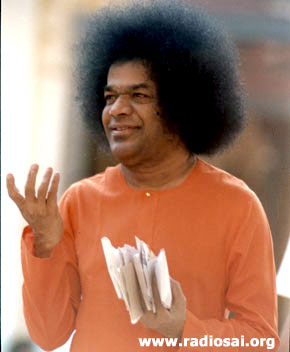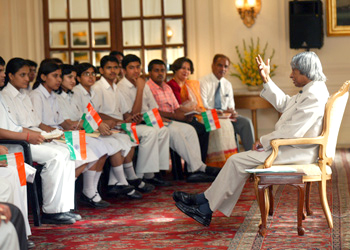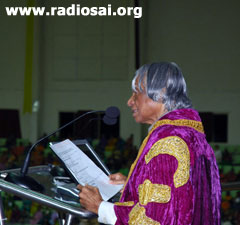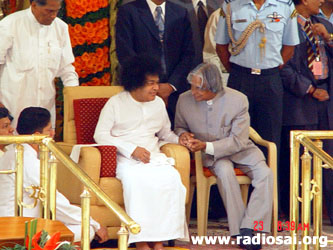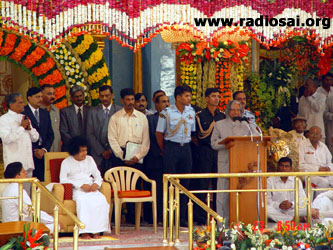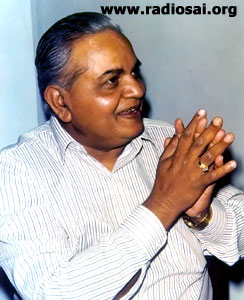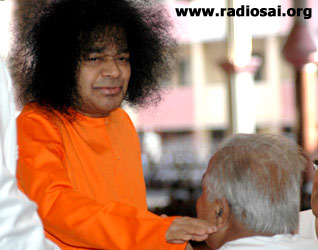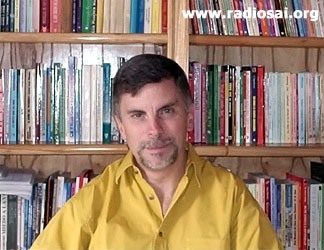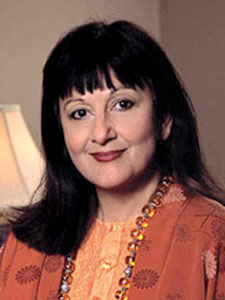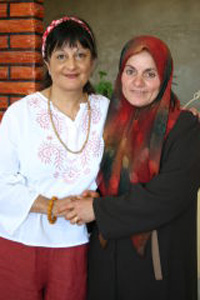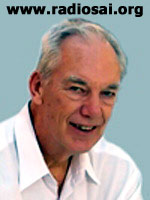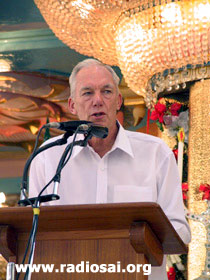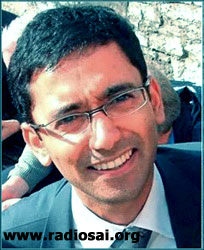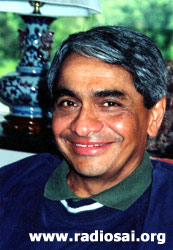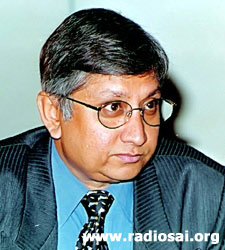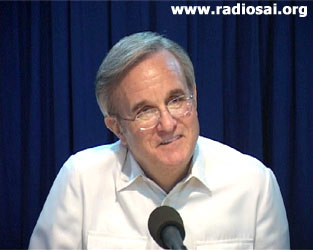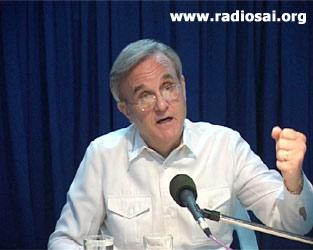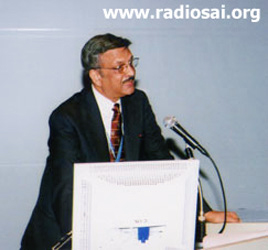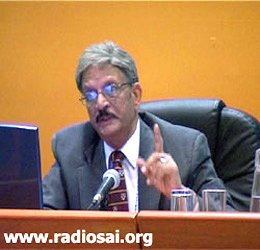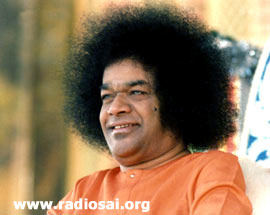 |
 |
 |
Volume
5 - Issue 08
AUGUST 2007 |
Enlightened Leadership …A Matter of Heart, Mind and Soul By Professor Peter Pruzan
An international leadership-authority we interviewed didn’t hesitate for a moment when asked about the purpose of business organizations: “It is to serve human needs. Period!” He added, “Spiritual-based leaders respect others. They are guided by the fundamental ethic: Service to others comes before serving one’s self. Individuals and organizations grow when they give themselves to others, and relationships improve when there is a focus on serving the other.” And this is exactly how Baba has summed up the role of not only leaders, but of all of us, in the unforgettable words: “Love all – serve all”. Such perspectives on leadership are not yet mainstream; but if you look for them, you can find an increasing number of inspiring and compassionate leaders who have a consciously held spiritual view of life and who lead their business from that basis. We know this to be a fact, since for the past five years, together with two research colleagues, in connection with an international research project, we have been interviewing executives from all around the world – from North and South America, Africa, Asia, Australia and Europe. They are all “top leaders” such as CEOs, Chairmen, Executive Vice Presidents, etc. In this article we will introduce you to leaders, all of whom are inspired by the teachings of Bhagavan Baba. The leaders we interviewed come from a wide variety of religious backgrounds: Hinduism, Buddhism, Christianity, Judaism and Islam, but their spiritual views may or may not be connected with an organized religion. Some of them are devotees of Baba, most of them are not. Common to them all, transcending the boundaries of nation, culture and tradition, is a deep awareness of what is truly important in life and a dedication to integrate this awareness and sensitivity into their leadership. They search for meaning, purpose and fulfillment in the external world of business as well as in the internal world of consciousness and conscience. Their external actions and their internal reflections are mutually supportive - so that spirituality and rationality go hand in hand, rather than being each other’s competitor.
We have found that spirituality is alive and well in the world of business, though in a subtle and often tacit way: not yet is it part of the common business vernacular; seldom is it explicitly expressed in corporate mission statements, policies, PR and reporting; and it is taught at only a small minority of MBA programmes throughout the world, significant amongst these being the Sri Sathya Sai University in Prasanthi Nilayam. Many business executives are becoming workaholic human-doings, longing to be full and integrated human-beings. They aspire to live with integrity, where their thoughts, values, words and deeds are in harmony. The problem is that they don’t know how to do so in a business world that is increasingly characterized by complexity, turbulence and greed. To lead from a spiritual basis means to lead with your heart, your mind and your soul. Our research shows that leaders of all kinds – not only in business, but also in government, public and private administration, hospitals, NGOs, etc. can achieve success, recognition, peace of mind and happiness, while at the same time serve the needs of all those affected by their leadership, when they lead with wisdom, from a spiritual basis. The question, however, is how do they do that? You will receive an impression of this when you meet ten down-to-earth spiritual based business executives who share their experiences with us. They are all inspired by the teachings of Bhagavan Baba and clearly demonstrate how these teachings are just as applicable in the turbulent world of business board rooms as in the silence of a meditation room. You will meet: G. Narayana as Executive Chairman of Excel Industries, India; Francisco Roberto Canada, Director of and Partner in Errepar S.A., Argentina;Amber Chand as co-founder and VP of Vision at Eziba, USA; John Behner, former Country Manager of Nabisco, El Salvador; Parantha Narendran as Director of Strategy at Eurotel Telecom, Czech Republic; Rajan Govindan, former Senior Managing Director, Bankers Trust, USA; V.V. Ranganathan as Senior Partner in Ernst & Young, India; Colombia;James Sinclair, Chairman of Tan Range Exploration, Ltd., USA/Tanzania;and Ananth Raman as Chairman of Graphtex, Inc., USA. First, however, you will meet a missile scientist, the Honourable President of India, Dr. A.P.J. Abdul Kalam, whom we interviewed in the majestic Indian “White House”, Rashtrapati Bhavan, New Delhi. President Kalam was interviewed as a shining example of spiritual-based leadership beyond business. He shows that you can be a spiritual-based leader no matter what kind of an organization you lead.
Defeat Your Problems and Succeed!
The story of the 11th president of India, A.P.J. Abdul Kalam is truly inspiring, particularly in these times characterized by religious strife and tension between scientific and humanitarian world-views. Dr. Kalam is a Muslim in a predominantly Hindu society. He is a rocket scientist with a deeply spiritual message. Throughout his career he has held highly responsible technical and scientific leadership positions. His experiences in leading such systems, however, did not shake his spiritual foundation; just the opposite. He told us: “The path of science can always wind through the heart. For me, science has always been the path to spiritual enrichment and self-realization.” “Each individual creature on this beautiful planet is created by God to fulfil a particular role. Whatever I have achieved in life is through His help, and an expression of His will. He showered His grace on me through some outstanding teachers and colleagues, and when I pay my tributes to these fine persons, I am merely praising His glory. All these rockets and missiles are His work through a small person called Kalam, in order to tell the several-million mass of India to never feel small or helpless. We are all born with a divine fire in us. Our efforts should be to give wings to this fire and fill the world with the glow of its goodness.” Aside from the large majority of Hindus, India also has the world’s second largest Muslim population and a minority of Christians, Buddhists, Jains, Sikhs, Parsis and Jews. President Kalam is the inspiring leader of this amazingly heterogeneous multi-religious, multi-cultural, multi-lingual democratic nation – the world’s largest democracy.
When we asked Dr. Kalam about the relationship between religion and spirituality in such a complex society, he provided us with a clear and concise reply: “When religion transforms into a spiritual force, people become enlightened citizens with a value system. It is therefore most important that, for the happiness, peace and prosperity of mankind, we transform our religious forces into spiritual forces. ” President Kalam’s passion is to meet with and speak with young people all around India, inspiring them with his vision of the future of India and of the role of values and spirituality. Indeed, on 22 November, 2006, he addressed the students, faculty and guests of the Sri Sathya Sai Institute of Higher Learning (now Sri Sathya Sai University ) with the words: “I am indeed honoured to deliver the 25th convocation address in the presence of Sri Sathya Sai Baba in this divine environment. My reverence to Baba and greetings to Vice-Chancellor Dr. A.V. Gokak, Professors, faculty members and staff who have been responsible for shaping not just graduates but human beings with great value systems drawn from our civilization’s heritage. At this point, I would like to quote a message from Baba: ‘Today people think that spirituality has no relationship to mundane life and vice versa. This is a big mistake. True divinity is a combination of spirituality and social obligations. National unity and social harmony are founded on spirituality. It is the divine that links spirituality and social existence.’” This energetic and optimistic leader of more than a billion people told us: “I learnt in my life, that if you don’t do anything, you won’t have any problems. But if you do something, suddenly something will pull off. Problems should not become your master. You have to become the master of the problems. God gives us the opportunity to grow through problems. You have to concentrate on what can be done, not what you think cannot be done. If I could, I would remove the word ‘impossible’ from the dictionary. Defeat your problems and succeed.”
When we then asked him about the core competence of business, President Kalam poetically replied: “The most important thing is righteousness, dharma. When there is righteousness in the heart, there is beauty in the character. When there is beauty in the character, there is harmony in the home. When there is harmony in the home, there is order in the nation. When there is order in the nation, there is peace in the world. You see the beautiful connectivity between these. The question before all of us today is, how do we get righteousness in the heart?”
A business leader who has for years focused on righteousness in the heart is G. Narayana, lovingly and respectfully referred to as ‘Guruji’ by those he inspires with his words of wisdom and his loving, generous behaviour. As you will now see, however, it took a crisis to awaken him to the beauty of his character.
The Miracle of the Bhagavad Gita At the time of the interview, G. Narayana was the Executive Chairman of Excel Industries, Pvt. Ltd., India. Excel is a highly respected manufacturer of agrochemicals, industrial chemicals and pesticides. In recent years the company has received special recognition for its focus on developing environmentally friendly bio-pesticides and solid waste management as well as for its spiritual-based leadership.
G. Narayana told how, as a young man, after successfully leading a number of companies, he had also established a computer services company called Prism which specialized in information systems. “In Prism, we purchased a hard disk computer. I invested all of my savings in Prism and my friends invested 50% of the capital. Within six months of our purchasing the hard disk computer, the personal computers (PCs) came into the market. PCs were much less expensive and had much more capability. Our then outdated system could not compete with PCs and the people whom we trained had many opportunities outside because of the IT boom. As a result, people started leaving Prism. Prism had yet to pay a considerable amount of loans and at this point, my ego started melting. I realized that it was not my greatness that made things successful at Voltas and New India (companies he had led earlier), it was the greatness of those organizations.” Experiencing fear, doubts and confusion, he went to his native village. “The situation at Prism was so critical that suicide became one of the alternatives,” he said. “But that alternative was not correct as our children were very young. While at my native place, we went to the Godavari River, and there was an old temple nearby. While my wife and I, my cousin, and his wife were in the waters of the Godavari, I asked my cousin if we could go to the temple and get a memento from the ruins of the old temple. He said, ‘Wait! Something is touching me in the river!’ He reached down and brought out two Shivalingams (elliptical stones representing the cosmos and that are worshipped as the ‘form’ of Lord Shiva in the Hindu religion) attached to a common base. He gave them to me. The two lingams represented Kaleshwar (death) and Mukteshwar (liberation). The message was clear: Liberation from my death-like situation was in the offing! I thought it was a fantastic day.” “In the afternoon, my wife Sujana and I reached her parents’ home where my brother-in-law was reading a book. I asked him ‘What is that book?’ He showed it to me and it was the Gita Makarandam, which is a commentary on the Bhagavad Gita. Till that time, I had not read even the first three verses of the Gita and I did not know Sanskrit. I always thought, ‘What is the need for Gita, when one is working 14 hours a day? In 18 chapters Gita is teaching about karma yoga (the spiritual practice of selfless work) and that’s what I am already doing!’ I was about to return the book to my brother-in-law; then I remembered the good omen of the Shivalingams in the morning. I thought this book, the Gita, was another blessing and I should not lose the opportunity. I opened the book at random and the following verse was present.” Narayana quotes from memory: “‘Whoever works with full dedication and offers everything to me, who works relentlessly, him, I will take out of the river of death and put him on the bank.’ This was the best guarantee I had ever heard,” he exclaimed. Narayana then took the book to his home and studied the Gita for 18 days. “Now, I had the Gita. Since the Guru (teacher) did not come, but only the book, with its commentaries on the Gita came, I took it to Baroda where I lived. The author was a well-respected swami, so I thought of him as my Guru and I did an 18-day Yoga (spiritual exercise) of studying the Gita. What I did then, I now call ‘Gita yoga’. I read one chapter every day, eating only one time a day, and completely avoiding alcohol, non-vegetarian food (which I was not taking anyway), tobacco … I observed silence while studying the Gita and I underlined whatever appeared wonderful, although everything looked wonderful in the Gita! I practised celibacy during all those 18 days.” “It was a fantastic experience. At the end of 18 days, I stood up and the world stood up along with me. I went back to the bank and assured them that I would pay back every rupee of the loan. I told my partners that I would pay back their investment. During those 18 days, new understandings flowed in my thought and consciousness. My fear was gone. My mind frames changed. Then I did Vipassana yoga (a special type of prolonged meditation) and it helped me to further develop my qualities.” “When I took responsibility with this new spirit, things started occurring that turned around my situation. With the new confidence and consciousness, solutions were shining and problems were dissolving. Then companies approached me and I became a management and turn-around advisor.” “In 1985 I got the Gita yoga and the rest all flowed from that. Before 1985 my wife and I were enemies. My children would not give me a birthday card; they would give to my wife, but not me. After 1985 everything changed with my family, it was the change in me, not in them. We now have a fantastic relationship.”
Today spirituality permeates G. Narayana’s entire being. He says: “Spirituality is experiencing divinity in others and self. Spirituality is inspired responsibility towards people, other living beings, and the world… seeing and relating with divinity in every aspect. Being responsible is being divine. Self-improvement plus world service equals spirituality.” “Being aware of all, inside and outside, reaching the hearts of others through love, and becoming a model… this is what Divinity is – reaching the hearts of others. Jesus is this kind of model, so is Buddha; and now, Sai Baba. They never hurt; they have done so much for society. They have reached our hearts. This is what I strive for in my own life and leadership.” Life has taught Narayana that man can be what he chooses to be. According to him, this freedom to choose opens the door of immense potential within each of us. “The first measure of success is the happiness of all stakeholders. The customers must be happy, the suppliers must be happy, employees must be happy, all must be happy. The Gita says, ‘If you do good work, you will get the returns, so do not worry about them.’ If you go for the returns, the work will not get done. You must do excellent work and not worry about your individual return.” In this connection Narayana says that his spiritual purpose is: “to return added value to the world; to be a being of love; to contribute, endeavour, excel, and assist others to excel.” “Whenever any person comes to me, in each transaction I evaluate: ‘When he leaves from my office, has he become small or has he become tall?’ I measure. If he has become small, I will not let him go; I make him sit. Only when he becomes tall he can go. Only when he becomes happy he can go. I may fight with him for eight hours, but I keep at it until he is happy. Only a happy man can escape from me. And everyone can judge whether the man is happy or not.”
While G. Narayana is a vivacious, outgoing spiritual-based leader always on the go, the next person you will meet is on all these counts the opposite; he is quiet, introverted, and contemplative; he even refers to himself as ‘a man of silence’. Yet, in spite of the fact that he never wanted to become a leader, he is today a modern karma yogi, leading four companies in Argentina .
The True Value of Business Francisco Roberto Canada is Director of and Partner in Errepar S.A. in Buenos Aires, the major Argentinean publisher of books and other materials for accountants. In addition, he has in more recent years also been a director and partner in three other publishing and manufacturing companies, all of which are co-owned with his two partners in Errepar S.A.
His entire career seems to have been an expression of his love and his search for true happiness, which he equates with spirituality. As he told us, “My spiritual principles and values can be summed up in one word: Love.” He has continually attempted to unite the spiritual and the material dimensions of life. As an expression of that love, and in spite of his having to deal with periods of severe illness, he has considered it to be his leadership responsibility to help others find their own true fulfilment. He told us, “The concept for business we work with, our goal, is to make people aware of their inner potentials, to help bring out these potentials, and to always strive for excellence. Excellence is the way that God made the world. I also think this should be the purpose of business in general.” Since his childhood Francisco Roberto Canada has been strongly influenced by the prevailing Catholicism in South America. While still practicing his Catholic faith, he now also finds spiritual upliftment, both in his private life and in his work life, in the teachings about religious tolerance and the underlying unity of all religions of Bhagavan Baba, whom he visits in India. He cited Swami: “There is only one religion, the religion of Love. If you are a Christian, go home and be a better Christian; if you are a Hindu, go home and be a better Hindu; if you are a Muslim, go home and be a better Muslim; if you are a Buddhist, go home and be a better Buddhist.” "For me, being a businessman has not always been easy, as I am a man of silence. All of my life, I have rejected the material world, and still I have become a big entrepreneur. It is not easy for me to be the head of four companies as a member of their boards. It’s difficult, it’s a problem; it’s not my nature. But I have been guided to do my work, so that I am able to live in the material world and combine work and business with spiritual growth. On some occasions I want to make myself little. I used to think that expansion was a sin, both as to business activity and status. But then I remember that Sathya Sai Baba says that expansion is not a sin; expansion is God. ” Three themes kept reappearing in our interview with Francisco Roberto Canada: “Hard work”, “Doing your duty with love and care”, and “Loving God.” For example, he said, “I pray that all people can do their duty with love and care. Therefore, as a leader, I make an effort that all our companies do good business, do good work, and make good products in the way of God, without breaking His law.” “In the beginning, work was a burden for my spirituality. But in the last ten years I have come to realize that happiness in life is to do all the work for God, to take part in God’s creation, and to leave the fruits of my actions, my products, to God. In doing this, I hope that my products in some way or another send people to Him.” Francisco Canada speaks about the influence that Sathya Sai Baba has had with his partners and their business, “All the three owners, who are also the three board members, have the same spiritual teacher. In fact, I took Sathya Sai Baba as my spiritual teacher when the partner who is the major owner of our companies introduced me to his teachings. At that time this partner went to visit him in India, and in a letter from the three of us, symbolically turned over the company to him. After that, we realised which direction to take.
“Like all difficult things, leading a business becomes easier as time goes by. Seven years ago we developed some principles of action in our company. We began to hold weekly meetings where we discussed leadership according to the principles of Sai Baba, as we read about them in a book on management, Sai Baba’s Mahavakya on Leadership, by retired Lieut. General in the Indian army, Dr. M.L. Chibber. In these meetings we discussed how to grow the company using spiritual principles. “When the company went through hard times for a period of roughly three years, the weekly meetings stopped. The difficult times arose when the company was being split from just one firm into four companies, each with its own newly hired general manager and with the three partners as the board for each of these companies. Recently we have taken up the weekly meetings again, but have changed them. Now the meetings are being run by trainers in each company and on different levels - with the managers, with the middle management, and with the employees. These trainers have been trained in working with human values, and the first results of the meetings are beautiful. “We talk about how to apply the teachings and principles of spiritual leadership, both at work and in our daily life. In these weekly meetings we focus on principles based on the human values of truth, right action, love, peace and non-violence - not on religion. We use examples from all religions, but each person has his own spiritual way. The employees accept this in a wonderful way. “But not everyone finds working with us to be so beautiful. Sometimes it happens that an employee doesn’t get on well with the company. They find that with the family spirit and the spiritual orientation which permeate our way of doing business, it has a different vibration than they are used to, and so they leave. “We are working to include the principles of the human values that are so central on our spiritual paths in the books we are publishing for primary and secondary schools. Our evaluation committee is working on this, contacting our authors and trying to integrate the human values into our books - not only into books about societal affairs, but also in books about mathematics, biology or history. And in all our publications we want to produce products recognized for their high quality. We aim at excellence in everything we do. “On some occasions we have had to refuse publishing a book if it did not align with our principles, even if the book would obviously sell many copies and give financial success to the company. The managers are very focused on earning money, and in many cases they have proposed publications which were not dharmic - meaning in these cases that they would not inspire people to act in a proper way. Such books we have turned down. “In the beginning, this attitude sometimes created confusion, but slowly the employees understood that their work was to lead them, and those affected by their work, in the direction of spiritual growth. When we select a book for publication, we focus on quality, in the broad, spiritual sense of the word. One of our activities is publishing spiritual, cultural, and educational books. These kinds of books are a reflection of the view of life, shared by all three of us partners. We look upon this activity as a possibility of helping to make a better world.”
Amber Chand, whom you will now meet, shares Francisco Canada’s ideal of work being a spiritual practice that can make the world a better place. However, her story of the ups and downs of Eziba reminds us that while spiritual-based leadership provides no guarantee of business success, it can be the source of peace of mind and courage, even amidst cataclysmic events that would otherwise shatter most business leaders.
Balancing Success and Failure
Amber Chand was the co-founder and VP of Vision at Eziba in the USA, when she was first interviewed about her being a spiritual-based leader. At that time, Eziba was a flourishing internet-based retailing company selling high quality crafts from poor artisans around the world. This anthropologist and international businesswoman reflected on her spiritual purpose: “When I think of my spiritual purpose in life, I think of ways in which it allows me to connect, both internally and externally. In quiet moments, I look to strengthening this place of internal refuge… an inner sanctuary where I go to connect with my spiritual teacher, Sathya Sai Baba, The other is the outer place of action and activity. In the world as a spiritual woman, I see my purpose as trying to find a way to put love into action. The company I have created is very much an expression of my sense of service, allowing me to use business as an important and purposeful platform for my spiritual practice, knowing that our work with artisans around the globe – many of whom are talented craftswomen – helps to support, sustain and strengthen their lives. I always felt that in founding this company I was following Swami’s guidance and finding a way to bring together my spiritual perspective into a more worldly business arena. This was to be a practice in humility in which I saw myself as simply the flute – His instrument – through which He would play.” Amber Chand narrated how her spiritual-based leadership unfolded with the help of very practical and down-to-earth examples, such as ‘Tea with Amber’. “As a co-founder of Eziba, I have tremendous amount of influence. I know when I walk through this company employees look to me sort of like a mother, a nurturing spirit. So I try to continually find ways to be that nurturing, reassuring, loving spirit for them. “About a year ago I created a new initiative and called it ‘Tea with Amber’. I was inspired to do this when, one day, my heart sank when I realized that the company had grown to such a degree that I no longer knew everybody. I could not see how I could be in the nurturer role if I didn’t know everyone by name. I began to search for a way that I could connect with everyone in the company. “So the idea came to me to just begin to have a cup of tea with every person. I rearranged my office completely, I created a little sitting area where I have some lamps and plants, I got out my lovely Mexican tea set and began to invite people to tea. Some people were very nervous because they were sitting with the co-founder. I would make them a cup of tea and what I noticed was that once they began to sip their tea, they would start to relax physically. Once we could both relax with each other, then we could actually open ourselves up to the ‘art of conversation’. “This is definitely something that the employees look forward to. It has become seen as a very important part of my work and as a way for us to continue to highlight Eziba as a company with a social conscience.” Another initiative Amber Chand started early on at Eziba was to speak to the customers who were dissatisfied. This was inspired by her spiritual background. She grew up in a Hindu household in Uganda, Africa, went to the Church of England while in boarding school, and has a strong interest in Buddhism. “In my childhood my mother and father taught me to treat a guest who came to our house as God. You do everything you can to make their time with you happy and satisfying and comfortable. During our first customer training, I told our people that at Eziba I like to feel that the customer is God. “We have a fabulous customer service group and yet I still want to speak with all of the unhappy customers. I pick up the phone and call them. I begin by apologizing to them: ‘I am so sorry that we have dissatisfied you in some way.’ I must tell you that customers are amazed; they cannot believe that one of the founders is taking the time to call them. From this call, I always end up with a happy customer; we usually end up feeling a lot of joy and laugh together. I tell them to call me again if they ever have any problems and I give them my direct line. So it is another way of being thoughtful. And it works.”
But while things worked for Amber Chand, they did not work for the company, which now had a board that was more focused on the bottom line than on selling high quality crafts from poor artisans around the world as “a way to put love into action”. With its loss of purpose, the company ran into great financial difficulties. When Amber Chand was next interviewed in spring 2006 – roughly a year after Eziba, the company she had invested her heart and soul in, went bankrupt – we were struck by how her engaged spirituality had enabled her to maintain peace of mind and courage in the face of Eziba’s demise. She told us, “Without the anchor of my spiritual practice, I could not have weathered this personal tsunami. For at some level, I knew that Eziba’s meteoric rise and fall were part of a larger archetypal story. That there were to be many lessons learned and that somehow I would find my way, guided by a sense of profound trust in life and the truth of who I am and what I believe in.” Amber Chand had by then founded a new business, The Amber Chand Collection, and reflected on her experiences with Eziba and her new endeavour: “I am grateful to Eziba for teaching me important lessons and in illuminating for me that one can indeed create successful businesses that are spiritually inspired – only when this becomes one’s singular mission and clear intent. I have no doubt that armed with patience, trust, focused clear effort and humility, the ‘Amber Chand Collection’ will grow successfully.”
Like Amber Chand, John Behner, whom you will now meet, also practices his leadership as an expatriate in a foreign culture. He too faced great crises, both in the form of a devastating earthquake and a civil war; his faith in God enabled him to transform such experiences into personal and organizational spiritual growth.
Just Love and Serve
John Behner, for 20 years, was the Country Manager in El Salvador of the huge USA-based multinational food-company Nabisco, which started as a major producer of cookies and snacks, but over the years expanded into many types of food products. Although born and raised in the USA, he has for the major part of his life lived in the Central American country of El Salvador where his wife Rose was born. Spirituality has been the focal point of his leadership. “Spirituality” he told us “is trying to see God in everyone and trying to interact with everyone on a very loving basis - being humble and trying to help.” What is most important to John Behner is “to realize my oneness with God. I see spirituality as having a personal relationship with God. What is my goal? It is to become one with God; in my personal life as well as at the workplace.” Shortly before starting to work for Nabisco, John R. Behner went to India, where he met Sathya Sai Baba, who became his spiritual teacher. A strong work ethic from his youth now became part of a spiritual quest. “Realizing God by serving others – and trying to see God in everyone” had become the guiding light on his search for self-realization. “Spirituality to me is the application of the human values - truth, right conduct, peace, love and non-violence - in your way of doing things. But it’s also more than that. It’s trying to see God in everyone and trying to interact with everyone on a very loving basis, seeing everything as being perfect, and not pointing your finger at anyone or anything. Each of the human values that you are trying to live and put into practice comes out in reflections of what you are doing. Being spiritual is being humble and trying to help. We had a beach house that used to be part of our ‘God’ before we knew our spiritual teacher, Sathya Sai Baba. The beaches in El Salvador are very beautiful, and every weekend we were at the beach with the kids at the swimming pool. Almost immediately after coming to know Sai Baba, we sold the beach house, because we realised that weekends were the only times we had when we could do service. So we got rid of it and tried to devote our time to doing service activities. “The purpose of business is to make other people happy - serving your customers and making sure that your customers are happy is the reason for your business and the reason for your being there. But not only your customers, your employees too should be happy. There should be a lot of employee enthusiasm and satisfaction, and this should be made part of this energy of trying to do the best they possibly can. I tried to instil in the employees the idea of serving, and that the reason for them to be there was to serve our clients and to do the best possible job. For example, if they were in manufacturing, they were told to look at the quality of the products as if they themselves were going to eat them.
“After I met Sathya Sai Baba, I started looking more closely at the products we were dealing with. Nabisco had a big plant in Ecuador where all the subsidiary companies like ours would buy the raw gelatine for their factories. The gelatine was made out of the skins of animals. I started experimenting with a vegetarian gelatine from a company called Kelko, and found out that if we used this instead of the animal gelatine, it would not form mould in the refrigerator after two or three days. To me, that was enough reason to stop buying gelatine from our company’s plant, and instead buy it from Kelko.” Citing another revealing incident, he says, “In 1986, there was a big earthquake in San Salvador, so we got a little experience in dealing with a crisis. One of the first things we saw was that all the supermarkets, which were our biggest clients, were affected; all their merchandize was all over the floor. They had a tremendous job of trying to clean what was saveable and to throw out what was broken and maybe take some kind of inventory of it. We also saw that our production lines were useless, because if the supermarkets could not put our products on their shelves, what good was it to produce it? So we shut down our production lines and sent the salesmen to all the major supermarkets. We offered them a team of our production people to help them clean up. We did this very successfully, and we were the only company that did it. All the supermarkets were happy to get this kind of service, which didn’t cost them anything. It only took about a week of very concentrated effort. It got them on their feet faster, so we could start selling faster. “We took stock of our employees, and we had nine employees who had lost their homes. Since we had shut down the production, our maintenance department wasn’t doing anything. So we asked these guys to go and rebuild the homes of these nine employees. Temporary structures were put up in the nine homes, and the employees were very grateful. El Salvador gets earthquakes periodically. In 1994 when we had another earthquake, we were all prepared, because we had already gone through the big one in 1986. “At a certain time, we decided to do some combined publicity for the company and Human Values-training. We went to local high schools and offered them an opportunity for the students to come to the plant. We had an auditorium, and I had each of my managers talk about one of the five human values: truth, right conduct, peace, love and non-violence, and how it affected his area. “The Controller would talk about truth, how truth is important in doing the bookkeeping, the accounting, paying the taxes, etc. The Sales Manager would talk about right conduct, how you have to treat the customers correctly. The Plant Manager talked about love, because he had to keep everybody in harmony, so the production would be good. The Quality Control Manager would talk about peace, that if you do your work right, you will be tranquil, because you’ll know that the quality of all the products is fine. The Maintenance Manager would talk about non-violence, that if you weren’t polluting and contaminating, then you would have non-violence. “The amazing thing was that the students would come in batches of a hundred, filling the auditorium. The managers were the ones who benefited the most, because they had to learn about these values to talk about them. Then they started seeing how the values worked in their job. The students would also understand the values in relation to a work ethic. As a result, some of the young people would apply to work with us, because they liked what they saw.” It was not only the young people who liked what they saw; under the many years of John Behner’s spiritual-based leadership, Nabisco in El Salvador was a highly successful and innovative company with dedicated workers and customers.
While the spiritual-based leaders you have met so far have had long careers, and were at least in their 50’s at the time they were interviewed, the next person you will meet is only in his 30’s. He tells how spirituality challenges him and makes him grow as he works on the cutting edge of ICT (information/communications technology).
Going Beyond Fear
Parantha Narendran was Director of Strategy at Eurotel Telecom in Prague in the Czech Republic, and 34 years old when we met him. Eurotel is the highly profitable and largest mobile telephone operator in the Czech Republic. In spite of his young age, Parantha Narendran had already considerable international experience; he was born and raised in Sri Lanka, educated in Holland and the UK, received spiritual inspiration in India, and worked in several parts of Europe. Prior to his top leadership position in the Czech Republic, due to his high ethical principles he had left a hi-tech consulting company and then co-founded Boon Consulting in London. There he had raised $40 million for a start-up company to be based on his own patented technology for improving the performance of the Internet when the ‘IT bubble’ was punctured and the market crashed in the beginning of this century. This brought an abrupt end to his plans of collecting the final $20 million that was necessary to establish the start-up and led him, after a period as consultant in the UK, to accept his top management position in Eurotel in early 2002. “The first time I went to India I visited an ashram and met the spiritual teacher Sathya Sai Baba. For the entire time I spent at the ashram, it was as if I could see the whole inter-connectedness of life, and I was aware of everything as I moved through my daily routine. It was effortless. I was aware of people’s thoughts and ideas. I was aware of everything going on in the background. I had no stress or anxiety. I just had awareness and contentment. I was changed quite a lot by that encounter by the time I came back to London. “I think the world needs spiritual-based leaders. I don’t openly talk with people about my spirituality, but I think they respect me as someone who is ethical, someone they can trust, and someone who works hard in a selfless way. I don’t have to talk about it. I just live it and people appreciate it, partly because in companies there are always political camps and I am seen as a neutral. Often when I talk, I do not say that this is the right thing to do. I will say, ‘It is in Eurotel’s best interest if we do this or do that.’ I think this helps me, and people respect this.” Parantha Narendran shared how being a leader helps him to grow spiritually: “I used to meditate as a child of about 10 or 11 and continued to do this until I was 16. After that I studied a lot of books dealing with spiritual matters. Recently I have felt that I don’t really need to do all of that; I just need to be open to myself. I’ve learned a lot about my spirituality and myself in the commercial world by having to make hard decisions. In these everyday challenges that I come across, I find that I grow and learn much more than if I were to read about spirituality or meditate. “If I think of how spirituality affects me at work, it would be that spirituality challenges me and makes me grow. For me, spirituality is how you live your life. When you view your life as spiritual, you do start to make certain choices. For example, I choose to be a vegetarian because I respect life. I am aware of violence when it appears in my thoughts, words, and deeds and I try to control that. There are certain positive values that I have accepted, and I try to be aware of all of those values in everything that I do. “I’ve learned a lot about my spirituality and myself in the commercial world by having to make hard decisions. I feel I have been forced to become a leader, something I had always wanted to avoid in my life. In these everyday challenges that I come across, I find that I grow and learn much more than if I were to read about spirituality or meditate.” Parantha Narendran not only reflected on responsibilities and success at work. He told us “I would say that success in my life would be learning to conquer my fears,” adding that what he seeks is “awareness and contentment.” “When I do not have an active ego, I am able to help get things done far more effectively. Essentially, it is like a game, and I am actually benefiting the most from the whole exercise. If my ego is active, then I tend to think, ‘I can’t do this and I can’t do that’ - a bit like when I was trying to raise money and didn’t have faith in myself. In that case I was forced into a position where I had to do what I thought I couldn’t do. I had to make something happen for the benefit of everybody. I had no time to step back and say, ‘I can’t do this’ because my ego was afraid of failure. I just had to get it done. And I’ve done this and realized that I was a lot more capable than I gave myself credit for. “I want others to learn the same thing. So I try to pass these lessons about ego and fear on to others when I speak to them. And I do this in a straightforward, down to earth manner. I look to see why they are motivated to achieve the goals they are speaking about and what inhibits them in achieving their goals - it makes them think more about their life. “Now that I am in this company as a leader and not as a consultant, a principle I have, is to try to help the people I work with to achieve their best potential. This is an area where I think that spirituality and the objectives of an organization happily coincide. I think that when a leader believes in empowering individuals, he has the best interests of the company at heart, and can use the empowerment as a vehicle to this end. Having the individual realize his potentials along with the spiritual aspects, and having the organization develop itself at the same time, are my primary and secondary goals.” Today Parantha Narendran has left Eurotel; he is involved in private equity investments in a number of European markets as well as an investor and shareholder in several new mobile operators in the central European market. Although he now works all over Europe in the telecom sector, he still maintains his base in Prague.
The next spiritual-based leader you will meet demonstrates that even leaders in the world of finance, where the typical mantra is that ‘the business of business is business’, can find strength and deeper meaning in life and work by leading from a spiritual basis. Rajan Govindan relates how visionary leaders “can integrate their analytical mind with their heart where the spirit resides … the spiritual heart that enables us to make decisions that we will never be sorry about.”
Doing Best and Leaving the Rest…to Him
Rajan Govindan, a former Senior Managing Director, Bankers Trust, USA, was 56 years old when he was interviewed for the research project. After a university education in India, the land of his birth, he followed his postgraduate studies in New York. Rajan stayed in the USA and has worked and lived there ever since, although he still has strong ties to India. He has a very clear view of his spiritual view of life and continually referred to the concept of being a good human being: “To me, spirituality in the workplace means two things: One is you have to be ‘correct and righteous.’ I hesitate to use the word ‘righteous’ because it has many connotations, but you have to be very correct in how you conduct yourself at work. I think this is one of the most important things and it can apply to everyone. The second is more personal to me and that is God has given me the work to do and I must leave the results up to God. It has taken me 35 years to really understand this. Work is an activity that has been given to me to do by God and I must do it well. “Spirituality to me is also that people should behave as human beings; this is actually what I mean when I say ‘correct and righteous,’ or ‘correct behaviour.’ To me this means that you must be honest, fair and objective. My personal goal is to become more human, not to be an animal as my spiritual teacher, Sathya Sai Baba, says. To me being a human being means to act with right conduct, to act with moral character in everything that I do. Being here in the USA for 36 years, it has taken all of this time to continuously focus on ‘How do I become a better human being?’ “All of my spiritual exercises are about how I spent my day. I think that when it comes to determining how well a job you have done, you must ask yourself, ‘Did I do the best I could?’ The only person, who really knows whether I did a good job or not is me. I don’t have the ability or desire to do all of the things that other more spiritually evolved people do. My path is to focus on acting from love each day, each moment, and not reacting. When I pray in the morning and at night, I do not ask for things for myself or my family. Instead, I ask to be able to think of love towards all. I try to think about the times that I have not spoken with love or when I got upset, so that I can learn from them. If I know I have something tough I am going to face that day, I pray that I will not lose control. Then in the evening, I look at what happened and see if I lost control or not and most importantly thank God for a wonderful day and a great life.” When asked about the purpose of business, Rajan Govindan replied: “The purpose of business is to make money through proper values. There is so much corruption today in business, and all of it represents an absence of values and an absence of character. Spirituality is clearly needed in business today. I think it is the business leaders’ purpose to ensure that the employees do things well for the company; it is their job to develop these values and character in people. You need to lead them so that they behave properly toward their customers and co-workers and so that the company is a wholesome place. When a company environment is wholesome it will be quite productive. “I sometimes feel that there is an inherent conflict between spirituality and being an investor – most investors want maximum return on their investments as quickly as possible while spirituality aims at the greater good for all. But without investors there are no opportunities for anyone! “Decision making that can be made using black and white analytical facts, mostly having to do with economic impact, is what our minds do best. But the best visionary leaders have been those who can integrate their analytical mind with their heart where the spirit resides – the spirit that always seeks the greater good for society and not personal gain; the spirit that is our moral compass and never lets us stray too far. It is the spiritual heart that enables us to make decisions that we will never be sorry about; it is the compassionate heart that makes our priorities right.” As of today Rajan Govindan is Chief Operating Officer at another major American financial institution, Bear Stearns Asset Management in New York . “As I have matured”, he said, “I have started to realize that it is not management that decides my destiny, but rather God. Unfortunately it is only when you get older that you see that everybody gets their just rewards, and the ones with principles and integrity are usually the happiest and most content, if not the richest. “After taking the COO position of Bear Stearns, I have realized that the only reason I am in this job is because God wanted me to be here, and now I am not worried or stressed out. I work hard and do my best, but now for the first time in my life, I am not worried about the results.”
Like Rajan Govindan, V.V. Ranganathan, the next spiritual-based leader you will meet, has a long experience in a field that focuses primarily on finances. He tells about how, as the auditor of large multinational corporations, he has been “confronted on almost a daily basis with situations where I have to pass transactions through my internal ‘ethics’ system” – a system that is “driven by consciousness … a consciousness that has its own existence. It comes into the mind; it is not a product of the mind or societal influences.”
Ethics and Selfless Service
V. Ranganathan was 53 years old and Senior Partner in the India branch of Ernst & Young at the time of the interview. At that time he was handling very few clients, most of whom were international and multi-national companies. He was also a member of the executive team that helped manage the Ernst & Young in New Delhi as well as the national risk management partner for the firm, whose services include accounting and auditing, tax reporting, business risk services, etc. “Yes,” he said, “this is quite a handful, but I have learned, over a period of time, not to get panicky. I have a firm belief that God Almighty will take care of things and that things will happen with or without me. I feel that my spiritual purpose is to be a person who performs selfless actions. Yes, God has given me the equipment to pursue my desires, but I must do so in such a manner that I remember the principles of karma (cause and effect) and that my decisions are not fuelled by selfishness or egoism. What I mean is that my effort and involvement in doing something is not determined or driven by what I get in return. And I know from my own experience that this works. “I heard someone telling me this a long, long time ago: The first thing to realize is: There is God, God is on earth, God is in you, and God is in everyone.’ If you are able to work in that context, it completely changes the way you look at people and then you start sharing that invisible bond. “If you are able to run any enterprise without selfish motives and with selfless service then I believe that success will fall into place. When the motive of running an operation is selfless service that does not mean you are running a charitable institution. It does not mean you give things away free and people come and go. It also does not mean that you cannot make profits. At an organizational level, success must be measured by the wealth that is created for all people. “Yes, we must make a profit; but most importantly, we must ask, ‘How did we make this profit?’ “As an auditor of large multi-national companies, I have been confronted on almost a daily basis with situations where I have to pass transactions through my internal ‘ethics’ system and see if they pass my litmus test: the Lakshman Rekha (the line that Lakshmana drew in the epic Ramayana delineating the limits within which Mother Sita would be safe). This is the imaginary boundary line that every individual has that he will not cross. “I think the current boundary line that has been dictated by ethics is driven largely by human knowledge, meaning that somebody tells you this is not right or that is not right. This is something you usually get from your childhood. When I refer to the Lakshman Rekha, I am talking about the invisible line that is within everyone’s system that is driven by consciousness. This is a consciousness that has its own existence. It comes into the mind; it is not a product of the mind or societal influences. It is something that can stand on its own. It has an independent standing of its own and is capable of influencing you. It is like a direct knowing, rather than a belief system. “Some people are afraid to contaminate their careers with ideas that do not have a scientific basis. So it is important to articulate spirituality very carefully in the business world. I am very careful and particular that I do not breach the trust I have developed with an individual when I relate to him at the spiritual level. You see a reflection of yourself in that other person and connect with him with utmost trust and truth. So never ever use this trust and confidence you have gained in that other person in the same way you use your ability or skill for achieving your ends or someone else’s. “I feel that my spiritual purpose is to be a karma yogi, a person who performs selfless actions. Yes, God has given me the equipment to pursue my desires, but I must do so in such a manner that I remember the principles of karma and that my decisions are not fuelled by selfishness or egoism. In my mind, being a yogi means to immerse myself in the work that I have been entrusted to do and perform it with devotion, without being driven by expectations and calculations of something in return. I believe that anyone who is moving towards this path of being a karma yogi will get more than they deserve. “I have always sought the help of my spiritual gurus... This is a continuous effort and the harder I try, the more juice I get. Spiritual gurus provide the focus and anchor your faith. It is like climbing a mountain with no summit or destination. It is a long journey and you have to struggle and enjoy every moment of that trek.” V.V. Ranganathan recently stepped down as a Senior Partner of Ernst & Young India to give more time to matters that are closer to his heart. These include founding a non-profit organisation that helps build capacities and accreditation to non-profits that run projects in rural education, health and employment, and chairing a product-incubation company, designed to help budding entrepreneurs to develop and grow their ideas into products or solutions.
The Power of Perseverance with Principles James Sinclair is the Chairman of Tan Range Exploration, Ltd., USA/Tanzania. He is known internationally for calling the top of the gold market in 1980. Being a trader came naturally to him, he told us. “My father was a man of extraordinary discipline and extraordinary human capacity, and was one of the greatest traders ever on Wall Street. As a result, I already knew what I wanted to be when I was six or seven years old. “Even as a kid I always wanted to know God, and I prayed, ‘I don’t know where you are or who you are, I just know you are. So you’ve got to find me ‘cause I don’t know how to find you’. My mother was a strong Catholic, but I wasn’t too much into church. However, I did know that there was something out there making it all happen,” he confided. “My spiritual practice has matured since I’ve known my spiritual teacher, Sathya Sai Baba. For me spirituality is a constant event within the human experience. It is included in our thoughts and activities that take place in our day-to-day lives. Creativity can materialise through any individual anywhere at anytime. But the means of that is what Sathya Sai Baba has taught and it is very simple: it is to “watch” and be happy. Whenever Swami teaches, he will always define a word in the meaning that he intends to communicate, so it may not necessarily be in the dictionary. “Watch” is to watch your words, actions, thoughts, character and heart. ‘Happy’ he defines as unity with Divinity. Be brave, don’t lie, do your job, quiet your mind and at the end of the day fold the cards. Wake up the next morning, see what’s dealt and play it the best you can, don’t worry about it. See the job, do the job and stay out of the misery. If there’s anything that attracts God, it’s having courage and having courage is doing what falls in your lap and doing it right, no matter what it is. “At one time, when looking deeper into the subject, I found one thing in common among the more successful people: introspection. What is introspection? It is quietude, a period of time for reflection. This quiet time is a period of retreat because it is sort of a ceremony. It is a period of time where I reflect upon the teachings of spiritual masters. I consider it to be a critical part of anyone’s life to seek this quietude. So in my organisation, everyday we start here with meditation, right in this office. Previously, I had an office with hundreds of people and even then we started exactly the same way. I tell them, ‘Take your time and be quiet; begin all activity in silence. Before or after lunch, however you do it, be silent. And before you leave the office at the end of the day, be silent.’ “When I was the Chairman of the Board of a public company in the late 80’s/early 90’s, their stock price grew from US 19 cents to US $56 and was then bought by a major corporation. How did we do this? We raised our corporate profile by our personal behaviour. I went to Tanzania, Africa and lived with the people and we acted as responsible citizens, undertaking the needs of an area of a developing country that was within the scope of our economic impact and environment. We saw to the needs of the people and their health; we built a hospital. My influence with this company was from 1989-1995. “But then after this level of success, the management began to act in extremely unethical ways. They were doing some very wrong things like stealing money from the stockholders for themselves and hurting people. I first went to my management and said, ‘Can I convince you not to act in this way?’ ‘No.’ ‘Can I plead with you not to act in this way?’ ‘No.’ ‘Can I pay you not to act in this way?’ ‘No.’ So I fired the management. The problem with this was, the management was also on the board, so they turned around and fired me. Then I called a special meeting of the shareholders to determine what to do with all of this, and that is called a proxy.
“In all of this, I became a warrior and fought against them. I asked them to cease and desist and change their policies and asked them to liquidate their major asset, which was a piece of land that they were going to build a mine on to extract gold. When they refused I executed the public proxy against them, which cost me personally US $5 million. Even though this was a modest company, the legal battle reached the level as if it were between two of the largest corporations in America. “The management immediately began to throw dirt at me, but through all of it, I never deviated from the high road. The way I handled this publicly was to say that they weren’t capable of building a mine and therefore the asset should be sold. I knew if you put US $300 million in these guys’ hands, it would have been a disaster. So that’s why I executed a proxy to force the sale of the company. “Do you know what hell is like? Hell is having 21 lawyers working for you. I put every cent I had in the world into it. No one paid me anything to do this. I did this because following God through my spiritual teacher and my sense of ethics had made me a warrior. “I was drinking 16 double espressos every day just to stay awake with all of the tension and fatigue, and eventually I went blind in one eye. They attempted to ruin my reputation. They sued my wife, they had detectives trailing my children, they said I was part of the mafia. They took my money on three different occasions using legal manoeuvres, but even after all of that I ended up beating them. “Initially I lost the proxy because they paid one of the stockholders to get his votes, but even then I still got 47.3% of the total vote. But that didn’t stop me. They had so many lawsuits that they couldn’t get financing to build the mine. What won in the end was nature. Nature was on my side. This property was so valuable that a company came in and bought it. James Sinclair told us that life has taught him that “The business of business and the business of life are one. The reason for living and working is to act and the reason to act is to seek excellence in everything that you do. If you are going to run a business, then run it well. The most successful person is the person with the least desires. The successful individual is the contented individual. So success could be as much about planning a garden as it is about running a major corporation.”
Just like James Sinclair, the next conscientious leader you will meet, Dr. Ananth Raman, focused strongly in his interview on the concepts of values and ethics: “Values such as justice, truth, and respect for others, equanimity, ability to take decisions, honesty and integrity are the core values that became very strong for me when I went into business. These are more on the ethical side, rather than on the spiritual side. Somewhere along the line however, these two kinds of values began to link. Now I think of ethical values as nothing but a reflection of my spiritual values.”
Business Ethics - Spiritual Values in Action
Ananth Raman was the Chairman of Graphtex, Inc., USA when he was interviewed for the research project. He is of Indian origin and a true product of his multi-cultural background, moving with equal ease in the globalized world of big business and the villages in his native India. Both of these environments have exerted a strong influence on his spiritual development. As Dr. Raman related, “I was taught by my mother that ethical values were the way to maintain order in society, so I naturally used them in my working experience over the last 30 years. The ethical guidelines that my corporation set up guided me in the right direction. Once I started thinking along the lines of spirituality, these kinds of ethical policies became a part of me. I discovered deeper values within each one of them. I realized that it is not just a good business practice to be ethical. We all have a duty, a role to perform, that has been given to us by God. “For me, spirituality is more of a matter of self-inquiry. I think that different people must take different routes. Some people do a lot of service to foster their spiritual growth. I prefer the path of knowledge, to learn more and to read more, has always been my path. Being a devotee of Sathya Sai Baba is largely responsible for my thinking in this way. In all activities, in all actions, whatever happens – whether I am successful or not – I can sit back and realise God’s guiding hand through all of it. Even when I feel He is pushing me into despair or into problems, I can see He is guiding me in all of it. I think that all of my self-inquiry has come about because of this spiritual teacher, Sai Baba. I can very easily see this. “ My spiritual development has helped me to institutionalize the principles of having a purpose, adding value, and setting an example. As a business leader I must set an example which others can follow. There is no point in me trying to get my organization to be truthful, unless I am truthful. “There was a time when we were introducing ISO 9000, which was a system of quality control measures for our company. One of our companies was a job shop where we do specialty items for our customers. Since these products are made for specific applications it is extremely difficult to standardize things and is a very complicated process. This made it a difficult environment to introduce these types of quality measures, since they involve a lot of rigid procedures. “The expert said, ‘This is all very simple. All you need to do is write down each of the procedures that you are already doing. You don’t have to make any improvement; you don’t have to say anything else except exactly the way you are doing it. This has nothing to do with right or wrong; you simply say what you are doing and do what you say.’ Even after he said all of this, my staff was still completely worried.
“One evening I was thinking about this while attending a study circle with my spiritual group. I saw that all of this was simply talking about unity of thought, word, and action. So, I called in my employees and told them, ‘This is nothing but the concept of having what you feel, what you write and how you act to be the same. This is all that ISO 9000 is about.’ “So we went all over the company and said, ‘The Company’s objective with ISO 9000 is to have unity of thought, word and action.’ If I had used the word spiritual to describe the basis of this concept, I would have probably gotten some negative reaction. To me it was truth and honesty. When I explained what unity of word, thought and action meant, they understood the concept very easily. “They started raising all kinds of questions throughout the departments; I was amazed at the chain reaction that began. So I told them, ‘Let’s have a monthly meeting where we can discuss these problems where you find it difficult to be totally truthful.’ I tried to help them see the difference between telling a customer, ‘no, it won’t go tomorrow, we are having difficulties,’ which is the truth, versus ‘it will go the day after tomorrow,’ which is a lie. In this way they could still buy some time without promising something which was not going to happen. We continue to have these monthly meetings where we examine these difficult situations and look to see how we can solve them with a unity of thought, word and action. “In a business sense, I like to talk about spirituality as ethical values. When I was in one of the West African countries, the country was full of corruption, and you couldn’t do anything without bribing someone. We were losing contracts and losing business. But the policy in my corporation was that you could not give bribes. At first, I wondered how I was going to get along without giving bribes. Ultimately, I chose to stay with the ethical values that the company ascribed to. Initially, I followed these ethical values because this was what I was taught. When I began thinking more spiritually, it gave me the reasons for why to behave this way. “Values such as justice, truth, and respect for others, equanimity, ability to take decisions, honesty and integrity are the core values that became very strong for me when I went into business. These are more on the ethical side, rather than on the spiritual side. Somewhere along the line however, these two kinds of values began to link. Now I think of ethical values as nothing but a reflection of my spiritual values. For instance, in business you must respect yourself, your feelings, your customers, your employees. But then when you go deeper into spirituality, your self-respect begins to include respecting the inner Self. Then you try to understand: “What is meant by Self?” Self means ‘I’, it means awareness.” Dr. Raman is now semi-retired and spends much of his time in his native India, where he has recently built a home in Bangalore, and where he is Honorary Professor at the Sri Sathya Sai University.
With Spirituality, Business Can Flourish! Each of the spiritual-based business leaders you have met here is a product of their own unique experiences, and every one has developed a distinct spiritual perspective on life and, in particular, on leadership. Each has their own unique way of expressing this spirituality in words and in deeds. And every leader has developed their own way of leading from their spiritual basis. When presenting our research results to audiences of MBA students and business leaders, however, we have at times met scepticism about leading from a spiritual basis. In particular, we have met two types of fears and doubts:
The first is the fear that one cannot be both spiritual and a successful leader. A reply to this fear is that all the executives that were interviewed for the research project have achieved their leadership positions while being spiritual. This in itself provides strong evidence that spirituality and obtaining a leadership position do not have to be mutually exclusive. Note that in saying this we are not implying that spirituality is the royal road to the top of the corporate pyramid - that the path is smooth and that personal success is ensured if you are spiritual. Some of the executives we, and our two research partners, have interviewed met great challenges. For example, one had to put his wealth at risk in order to stop harm, another had to deal with a painful downsizing, and the third had to face the challenges owing to business failure. Just as jogging and eating organic food do not provide a guarantee of a long and healthy physical life, neither is a spiritual perspective on leadership a guarantee of a long-lived and healthy organization or a long-lived and successful career. But the stories presented here clearly demonstrate that it is possible to draw upon both rationality and spirituality in successfully leading a business and oneself. The second source of scepticism we have met is the belief that in order to be spiritual one must renounce the world and its material wealth. If this were so, it would clearly be impossible to be a spiritual-based leader. This fear can be dispelled by the fact that some of the executives we have interviewed lead rather affluent lives, to put it mildly. Others live in modest dwellings with a simple lifestyle, all according to their values and aspirations. However, none of them indicated that wealth is an impediment to living a spiritual life or leading from a spiritual basis. In fact, many of the leaders we interviewed told how they had used their wealth to initiate humanitarian service projects – some even on a grand scale. So the bottom line is faith - the strong conviction and belief that business can be successfully developed from a spiritual basis; and that you can be a successful leader if you practice your leadership from your heart, mind and soul... where success transcends traditional economic rationality and includes loving and serving all. This is what was so convincingly demonstrated by each of the ten spiritual-based business leaders you met above, all of whom were inspired by the teachings of Baba. Dr Peter Pruzan is Professor Emeritus at the Department of Management, Politics and Philosophy, Copenhagen Business School, Denmark and a visiting professor in Sri Sathya Sai University. Kirsten Pruzan Mikkelsen is an eminent journalist and former newspaper editor at Berlingske Tidende, a major daily national newspaper in Denmark. They are authors of "Leading with Wisdom: Spiritual-based Leadership in Business" (Sage/Response Books, New Delhi and Greenleaf Publishing, UK), and can be reached at : Leading.with.Wisdom@gmail.com Dear reader, how did you like this cover story? Did it help you in anyway? Would you like more of such stories? What other suggestions do you have for future cover stories? Please tell us at h2h@radiosai.org. Thank you so much for your time.
|
||||||||||||||||||||||||||||||||||||||||||||||||||||||||||||||||||||||||||||||||||||||||||||||
| You can write to us at : h2h@radiosai.org |
Vol 5 Issue 08 - AUGUST 2007
|
Best viewed in Internet Explorer - 1024 x 768 resolution. |

